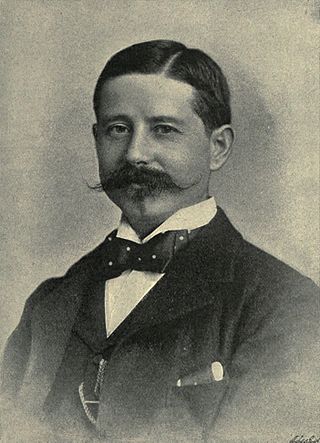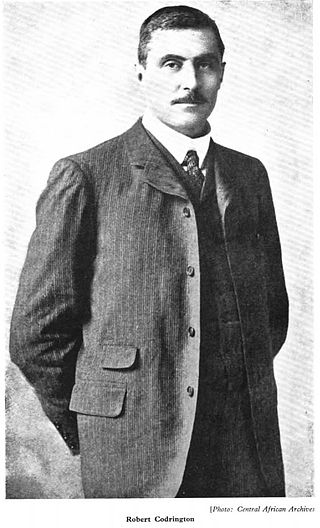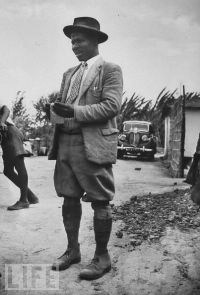Related Research Articles

Cecil John Rhodes was an English mining magnate and politician in southern Africa who served as Prime Minister of the Cape Colony from 1890 to 1896. He and his British South Africa Company founded the southern African territory of Rhodesia, which the company named after him in 1895. He also devoted much effort to realising his vision of a Cape to Cairo Railway through British territory. Rhodes set up the Rhodes Scholarship, which is funded by his estate.

The British Central Africa Protectorate (BCA) was a British protectorate proclaimed in 1889 and ratified in 1891 that occupied the same area as present-day Malawi: it was renamed Nyasaland in 1907. British interest in the area arose from visits made by David Livingstone from 1858 onward during his exploration of the Zambezi area. This encouraged missionary activity that started in the 1860s, undertaken by the Universities' Mission to Central Africa, the Church of Scotland and the Free Church of Scotland, and which was followed by a small number of settlers. The Portuguese government attempted to claim much of the area in which the missionaries and settlers operated, but this was disputed by the British government. To forestall a Portuguese expedition claiming effective occupation, a protectorate was proclaimed, first over the south of this area, then over the whole of it in 1889. After negotiations with the Portuguese and German governments on its boundaries, the protectorate was formally ratified by the British government in May 1891.

Sir Henry Hamilton Johnston was a British explorer, botanist, artist, colonial administrator, and linguist who travelled widely across Africa to speak some of the languages spoken by people on that continent. He published 40 books on subjects related to the continent of Africa and was one of the key players in the Scramble for Africa that occurred at the end of the 19th century.

Northern Rhodesia was a British protectorate in Southern Africa, now the independent country of Zambia. It was formed in 1911 by amalgamating the two earlier protectorates of Barotziland-North-Western Rhodesia and North-Eastern Rhodesia. It was initially administered, as were the two earlier protectorates, by the British South Africa Company (BSAC), a chartered company, on behalf of the British Government. From 1924, it was administered by the British Government as a protectorate, under similar conditions to other British-administered protectorates, and the special provisions required when it was administered by BSAC were terminated.

Southern Rhodesia was a landlocked, self-governing British Crown colony in Southern Africa, established in 1923 and consisting of British South Africa Company (BSAC) territories lying south of the Zambezi River. The region was informally known as South Zambesia until annexation by Britain, at the behest of Cecil Rhodes's British South Africa Company. The bounding territories were Bechuanaland (Botswana), Northern Rhodesia (Zambia), Portuguese Mozambique (Mozambique) and the Transvaal Republic.
This article deals with the disputed area on the borders of the Democratic Republic of the Congo and Zambia, in Luapula Province.

The British South Africa Company was chartered in 1889 following the amalgamation of Cecil Rhodes' Central Search Association and the London-based Exploring Company Ltd, which had originally competed to capitalize on the expected mineral wealth of Mashonaland but united because of common economic interests and to secure British government backing. The company received a Royal Charter modelled on that of the British East India Company. Its first directors included The 2nd Duke of Abercorn, Rhodes himself, and the South African financier Alfred Beit. Rhodes hoped BSAC would promote colonisation and economic exploitation across much of south-central Africa, as part of the "Scramble for Africa". However, his main focus was south of the Zambezi, in Mashonaland and the coastal areas to its east, from which he believed the Portuguese could be removed by payment or force, and in the Transvaal, which he hoped would return to British control.

Rhodesia, known initially as Zambesia, is a historical region in southern Africa whose formal boundaries evolved between the 1890s and 1980. Demarcated and named by the British South Africa Company (BSAC), which governed it until the 1920s, it thereafter saw administration by various authorities. It was bisected by a natural border, the Zambezi. The territory to the north of the Zambezi was officially designated Northern Rhodesia by the company, and has been Zambia since 1964; that to the south, which the company dubbed Southern Rhodesia, became Zimbabwe in 1980. Northern and Southern Rhodesia were sometimes informally called "the Rhodesias".
A major strike broke out among African mineworkers in the Copperbelt Province of Northern Rhodesia on 29 May 1935 in protest against taxes levied by the British colonial administration. The strike involved three of the province's four major copper mines: those in Mufulira, Nkana and Roan Antelope. Near the latter, six protesters were killed by police and the strike ended. Although it failed, the strike was the first organized industrial agitation in Northern Rhodesia and is viewed by some as the first overt action against colonial rule. It caught the attention of a number of African townsmen, leading to the creation of trade unions and African nationalist politics, and is seen as the birth of African nationalism.

The Zambia Independence Act 1964 was an act of the Parliament of the United Kingdom which granted independence to Zambia with effect from 24 October 1964. It also provided for the continuation of a right of appeal from Zambia to the Judicial Committee of the Privy Council. It was introduced by Andrew Cavendish, 11th Duke of Devonshire Under-Secretary of State for Commonwealth Relations.

Sir Alfred Sharpe was Commissioner and Consul-General for the British Central Africa Protectorate and first Governor of Nyasaland.

Robert Edward Codrington was the colonial Administrator of the two territories ruled by the British South Africa Company (BSAC) which became present-day Zambia. He was Administrator of North-Eastern Rhodesia, based at Fort Jameson, now Chipata, from 11 July 1898 to 24 April 1907, and then of North-Western Rhodesia, based at Livingstone from February 1908 to his death in London on 16 December 1908 from heart disease at age 39. He laid the foundation for the amalgamation of the two territories as Northern Rhodesia four years later.

Edward Arthur Maund was an African explorer and Rhodesian pioneer.

James Frederick Sangala was a founding member of the Nyasaland African Congress during the period of British colonial rule. Sangala was given the nickname "Pyagusi", which means "one who perseveres".
Levi Zililo Mumba was a leading local politician and the first President of the Nyasaland African Congress (NAC) during the period of British colonial rule in Nyasaland, which became the independent state of Malawi in 1964. Mumba was probably the most important figure in the development of Malawi politics between World War I and World War II.

The history of rail transport in Zambia began at the start of the twentieth century.
The Anglo-Portuguese Treaty of 1891 was an agreement between the United Kingdom and Portugal which fixed the boundaries between the British Central Africa Protectorate, and the territories administered by the British South Africa Company in Mashonaland and Matabeleland and North-Western Rhodesia and Portuguese Mozambique, and also between the British South Africa Company administered territories of North-Eastern Rhodesia, and Portuguese Angola.
John Buchanan (1855–1896), was a Scottish horticulturist who went to Central Africa, now Malawi, in 1876 as a lay member of the missionary party that established Blantyre Mission. Buchanan came to Central Africa as an ambitious artisan: his character was described as dour and devout but also as restlessly ambitious, and he saw in Central Africa a gateway to personal achievement. He started a mission farm on the site of Zomba, Malawi but was dismissed from the mission in 1881 for brutality. From being a disgraced missionary, Buchanan first became a very influential planter owning, with his brothers, extensive estates in Zomba District. He then achieved the highest position he could in the British administration as Acting British Consul to Central Africa from 1887 to 1891. In that capacity declared a protectorate over the Shire Highlands in 1889 to pre-empt a Portuguese expedition that intended to claim sovereignty over that region. In 1891, the Shire Highlands became part of the British Central Africa Protectorate. John Buchanan died at Chinde in Mozambique in March 1896 on his way to visit Scotland, and his estates were later acquired by the Blantyre and East Africa Ltd.

The history of the Jews in Zambia goes back to the early 1900s. Jews were always a small community with a notable role in Zambian history. The history of the Jews in Zambia dates to 1901 when it was still under British Colonial rule. Northern Rhodesia was colonized in the 1890s by the British South Africa Company, otherwise known as BSAC. Initially, Northern Rhodesia was split into North-eastern and North-western Rhodesia. However, the BSAC united them in 1911 to form Northern Rhodesia, which has its capital in Livingstone, near Victoria Falls. Among the population of 1 million people, there were 1,500 white residents in Northern Rhodesia, of whom many were the Jewish settlers. Northern Rhodesia became under British Colonial Rule partially so that the British Government could increase the number of white individuals and settlers in the country, which would contribute to a wider strategy to increase the influence that the British has between Kenya and South Africa. The Jewish settlers were one of the dominant ethnic groups and became highly involved in local politics, with prominent Jewish figures driving the push for Zambian independence and African nationalist rhetoric. Northern Rhodesia’s fertile land, World War II, and independence from the British Colonial rule all had a profound impact on both immigration and emigration of Jewish refugees. The Jewish diaspora introduced trade and commerce into the region in both regional and urban areas through cattle trading, ranching, mining, communication networks, storefronts, transport, and butchery, amongst others. The Jewish settlers, whether they are Jewish through origin, birth, marriage, or confession, all formed a small, yet strong community. The Jews in Zambia were a Jewish diaspora cultural and religious settler minority group, which raises concerns about the notion of who is the coloniser, who is the colonised, who is the victim and who is the oppressor. This deems that it can be studied through a postcolonial framework. Following Zambia's independence in 1964, there was a large exodus of Jews and white individuals from the country. In 2022, there remains less than fifty Jews in Zambia.After existence for 130 years as of 15 June 2024 the total of Jews in Zambia numbers 11
Cinema of Zambia refers to the cinema and film industry of the country of Zambia.
References
- ↑ https://www.freebmd.org.uk has one of his name born in Newcastle, Q4-1873 and another born in Tynemouth, Q3-1876
- ↑ Extract from 'Generation of Men' by W Vernon Brelsford